Ditapis dengan
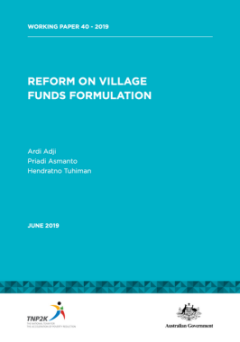
Reform On Village Funds Formulation
The Law No. 6 of 2014 about the Village brought fundamental changes in the management, arrangement and implementation of village governance. In village finances, the law governs the source of village income which can implicates the budget allocation for the village, both sourced from the central budget as well as the regional budget. Since the year 2015, the allocation of village funds increase…
- Edisi
- Working Paper 40 - 2019
- ISBN/ISSN
- -
- Deskripsi Fisik
- PDF, 21 Halaman
- Judul Seri
- Working Paper
- No. Panggil
- 352.14 ADJ r
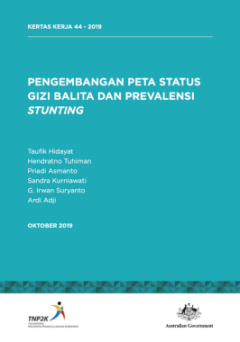
Pengembangan Peta Status Gizi Balita dan Prevelansi Stunting
Indonesia masih menghadapi tantangan besar dalam isu kekurangan gizi kronis pada balita, yang ditunjukkan oleh tingginya prevalensi balita stunting. Untuk mengukur efektivitas dan mempertajam penargetan upaya pencegahan stunting, pemerintah memerlukan informasi mengenai tingkat dan sebaran prevalensi balita stunting pada tingkat wilayah administrasi yang lebih rendah dari tingkat kabupaten/kota…
- Edisi
- Kertas Kerja 44 - 2019
- ISBN/ISSN
- -
- Deskripsi Fisik
- PDF, 48 Halaman
- Judul Seri
- Working Paper
- No. Panggil
- 362.196398 SUR p
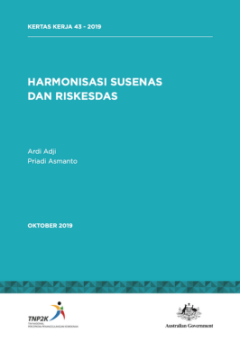
Harmonisasi Susenas dan Riskesdas
Keberhasilan program penurunan prevalensi stunting memerlukan data dan informasi yang akurat dan tepat waktu sebagai dasar penetapan target dan tujuan yang ingin dicapai. Riskesdas digunakan untuk menghasilkan indikator guna melihat status kesehatan masyarakat Indonesia dan memantau berbagai keberhasilan program pemerintah di sektor kesehatan, sementara itu Susenas digunakan untuk menghasilkan …
- Edisi
- Kertas Kerja 43 - 2019
- ISBN/ISSN
- -
- Deskripsi Fisik
- PDF, 20 Halaman
- Judul Seri
- Textbook dan Working Paper
- No. Panggil
- 362.109598 ADJ h
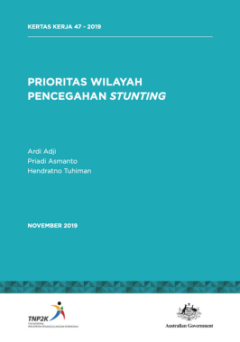
Prioritas Wilayah Pencegahan Stunting
Salah satu faktor kesehatan yang masih membutuhkan perbaikan adalah stunting. Indonesia adalah negara dengan prevalensi stunting tertinggi kelima di dunia. Untuk mencapai target angka stunting sebesar 28% sebagaimana dalam RPJMN 2015-2019, pemerintah pada tahun 2018 telah menetapkan prioritas wilayah pencegahan stunting di 100 Kabupaten/Kota dan diperluas secara bertahap sampai dengan tahun 202…
- Edisi
- Kertas Kerja 47 - 2019
- ISBN/ISSN
- -
- Deskripsi Fisik
- PDF, 25 Halaman
- Judul Seri
- Textbook dan Working Paper
- No. Panggil
- 362.196398 ADJ p
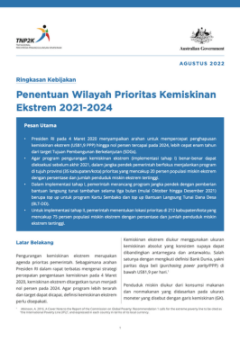
Penentuan Wilayah Prioritas Kemiskinan Ekstrem 2021-2024
The rural economy makes a significant contribution to the national economy. At present, the impact of the Covid-19 pandemic is felt more in urban areas. Due to the high mobility of seasonal rural workers commuting between their home villages and cities, however, the impact on the rural economy needs to be anticipated promptly.
- Edisi
- 1
- ISBN/ISSN
- -
- Deskripsi Fisik
- PDF, 20 Halaman
- Judul Seri
- Policy Brief
- No. Panggil
- 362.5 ADJ.P
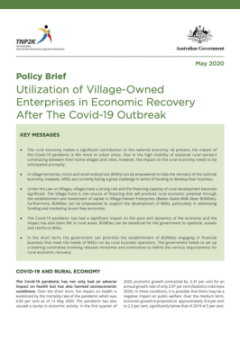
Policy Brief Utilization of Village-Owned Enterprises in Economic Recovery Af…
The rural economy makes a significant contribution to the national economy. At present, the impact of the Covid-19 pandemic is felt more in urban areas. Due to the high mobility of seasonal rural workers commuting between their home villages and cities, however, the impact on the rural economy needs to be anticipated promptly.
- Edisi
- 1
- ISBN/ISSN
- -
- Deskripsi Fisik
- PDF, 10 Halaman
- Judul Seri
- Policy Brief
- No. Panggil
- 362.5 ASM. P
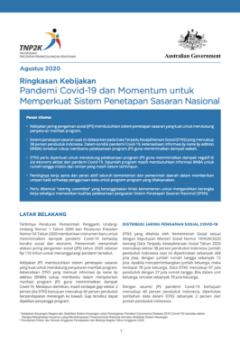
Ringkasan Kebijakan Pandemi Covid-19 dan Momentum untuk Memperkuat Sistem Pen…
Terbitnya Peraturan Pemerintah Pengganti UndangUndang Nomor 1 Tahun 2020 dan Peraturan Presiden Nomor 54 Tahun 2020 memberikan instrumen baru untuk meminimalkan dampak pandemi Covid-19 terhadap kondisi sosial dan ekonomi. Pemerintah menambah alokasi jaring pengaman sosial (JPS) tahun 2020 sebesar Rp 110 triliun untuk menanggulangi pandemi tersebut.
- Edisi
- 1
- ISBN/ISSN
- -
- Deskripsi Fisik
- PDF, 8 Halaman
- Judul Seri
- Policy Brief
- No. Panggil
- 361.1 ASM.R
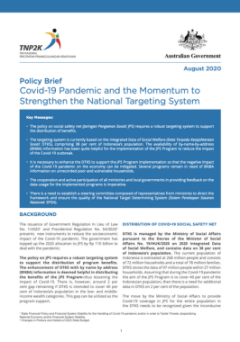
Policy Brief Covid-19 Pandemic and the Momentum to Strengthen the National Ta…
The policy on JPS requires a robust targeting system to support the distribution of program benefits. The enhancement of DTKS with by name by address (BNBA) information is deemed helpful in distributing the benefits of the JPS Program–thus lessening the impact of Covid-19. There is, however, around 2 per cent gap remaining if DTKS is intended to cover 40 per cent of Indonesia’s population i…
- Edisi
- 1
- ISBN/ISSN
- -
- Deskripsi Fisik
- PDF, 10 Halaman
- Judul Seri
- Policy Brief
- No. Panggil
- 361.1 ASM.P
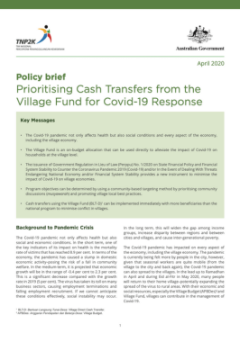
Policy brief Prioritising Cash Transfers from the Village Fund for Covid-19 R…
The Covid-19 pandemic not only affects health but also social and economic conditions. In the short term, one of the key indicators of its impact on health is the mortality rate of victims that has reached 8.9 per cent. In terms of the economy, the pandemic has caused a slump in domestic economic activity–posing the risk of a fall in community welfare. In the medium-term, it is projected that…
- Edisi
- 1
- ISBN/ISSN
- -
- Deskripsi Fisik
- PDF, 8 Halaman
- Judul Seri
- Policy Brief
- No. Panggil
- 352.54 ASM.P
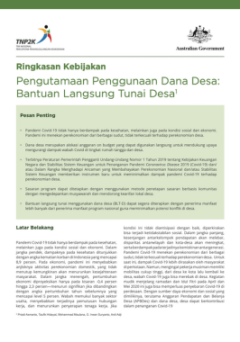
Ringkasan Kebijakan Pengutamaan Penggunaan Dana Desa: Bantuan Langsung Tunai …
Pandemi Covid-19 tidak hanya berdampak pada kesehatan, melainkan juga pada kondisi sosial dan ekonomi. Dalam jangka pendek, dampaknya pada kesehatan ditunjukkan dengan angka kematian korban di Indonesia yang mencapai 8,9 persen. Pada ekonomi, pandemi ini menyebabkan anjloknya aktivitas perekonomian domestik, yang tidak menutup kemungkinan akan menurunkan kesejahteraan masyarakat. Dalam jangka m…
- Edisi
- 1
- ISBN/ISSN
- -
- Deskripsi Fisik
- PDF, 8 Halaman
- Judul Seri
- Policy Brief
- No. Panggil
- 352.54 ASM.P
 Karya Umum
Karya Umum  Filsafat
Filsafat  Agama
Agama  Ilmu-ilmu Sosial
Ilmu-ilmu Sosial  Bahasa
Bahasa  Ilmu-ilmu Murni
Ilmu-ilmu Murni  Ilmu-ilmu Terapan
Ilmu-ilmu Terapan  Kesenian, Hiburan, dan Olahraga
Kesenian, Hiburan, dan Olahraga  Kesusastraan
Kesusastraan  Geografi dan Sejarah
Geografi dan Sejarah